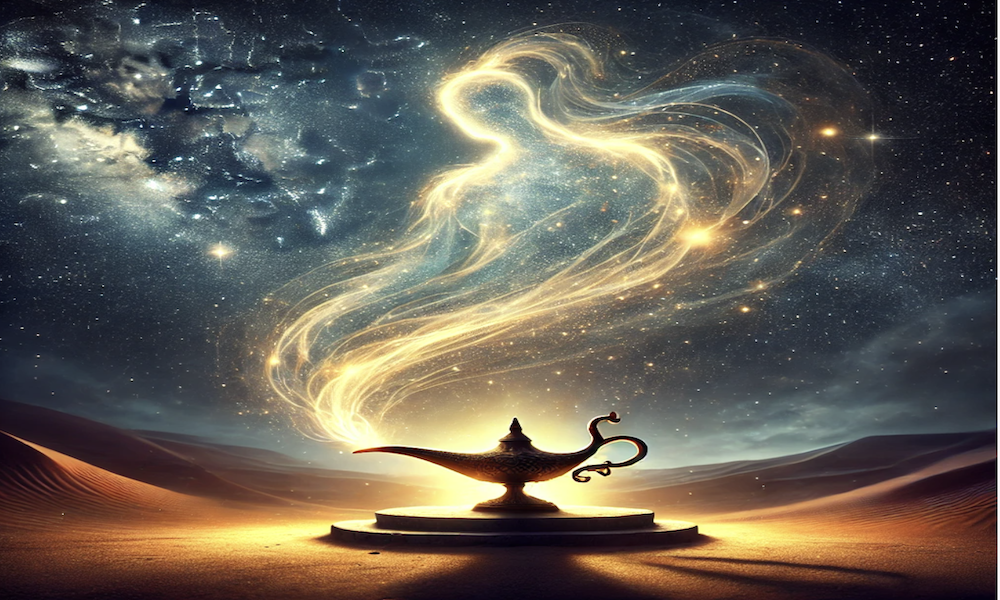True Power, Servanthood, and the Heart of God
When I first watched Aladdin, I never expected to see a glimpse of God’s nature hidden in an animated film. But as I reflected on the ending—when Jafar, consumed by his lust for power, wished to become an “all-powerful genie”—something clicked.
Jafar got his wish—but in the end, it wasn’t what he expected. Instead of ruling over all, he found himself trapped in a lamp, bound to serve. Meanwhile, the Genie, who had been bound in servitude for 10,000 years, longed for nothing more than freedom.
And suddenly, I realized:
This reveals something profound about true power, servanthood, and the nature of God Himself.

Jafar’s Mistake: Seeking Power Without Understanding
Jafar believed power meant dominance—having control, ruling over all, and answering to no one. He saw power as a means to elevate himself above others.
But he didn’t realize that true power is not about ruling over people—it’s about serving them.
Jesus taught this exact lesson:
📖 “You know that those who are regarded as rulers of the Gentiles lord it over them… Not so with you. Instead, whoever wants to become great among you must be your servant, and whoever wants to be first must be slave of all. For even the Son of Man did not come to be served, but to serve, and to give his life as a ransom for many.” – Mark 10:42-45
Jafar wanted power without servanthood. But Jesus said, “If you want to be great, serve.” (Read our article entitled “Service: The Road To Greatness.”)
💡 Jafar thought power meant freedom—but in reality, his version of power led to bondage.
The Genie’s Freedom: A Picture of God’s Heart?
If true greatness is servanthood, then why did the Genie long to be free? Shouldn’t he have embraced his role of serving others?
Here’s the difference:
✅ The Genie was forced to serve.
✅ Jesus chose to serve.
There’s a huge difference between forced servanthood and willing servanthood. The Genie was in bondage—his service wasn’t out of love, but obligation. But Jesus?
📖 “Though He was in the form of God, He did not consider equality with God something to be grasped. Instead, He emptied Himself by taking the form of a servant… He humbled Himself by becoming obedient to the point of death—even death on a cross.” – Philippians 2:6-8
💡 Jesus wasn’t a servant because He had to be. He was a servant because He wanted to be.
And after He served, what happened?
📖 “Therefore, God has highly exalted Him and given Him the name above every name…” – Philippians 2:9
Because God exalts those who humble themselves.
“The Only Place to Go is Down” – The Greatest Paradox of All
Something else hit me:
If God is the Most High, the only place left to go is down.
That’s exactly what Jesus did.
He came down to be with us. He stooped down to wash His disciples’ feet. He laid down His life for us.
And that’s not a contradiction of His greatness—that’s the very proof of it.
📖 “I am among you as one who serves.” – Luke 22:27
The greatest One of all is the One who serves all.
Jafar never understood that. He thought greatness meant rising up. But Jesus showed us true greatness means laying yourself down.
Jesus & the Sons of Thunder: “You Don’t Know What You’re Asking”
This reminds me of a conversation between Jesus and two of His disciples, James and John (the “Sons of Thunder”).
They came to Jesus with a bold request:
📖 “Let one of us sit at your right and the other at your left in your glory.” – Mark 10:37
They wanted power. They wanted a throne.
But Jesus responded:
📖 “You don’t know what you are asking. Can you drink the cup I drink?” – Mark 10:38
They thought power meant ruling, but Jesus knew power meant suffering.
To sit at His right and left meant going through what He went through—laying down their lives. They wanted the glory but didn’t understand the cost.
💡 Like Jafar, they wanted power without sacrifice. But Jesus knew that true power requires laying yourself down.
A Final Thought: Did the Creators of Aladdin Understand This Truth?
I don’t know if the writers of Aladdin meant for this message to be there, but it’s unmistakable:
✅ Seeking power for its own sake leads to bondage (Jafar).
✅ Being forced to serve is slavery (Genie).
✅ Choosing to serve out of love is true greatness (Jesus).
Jesus didn’t have to serve—He chose to.
Jesus didn’t have to lay His life down—He wanted to.
And that’s why, in the end, He is King of Kings.
🔥 Mind blown. The story of Aladdin actually holds a deeply biblical truth. If we truly want to be like God, we must follow Jesus’ example. Not seeking power, but choosing servanthood out of love, not obligation.
And in the Kingdom of God, those who lay themselves down will one day rise again.
The Creator’s Design
Ultimately, I believe that the truths we see reflected in stories like Aladdin resonate with God’s truth because they are not just abstract concepts; they are deeply embedded within us, written in our hearts and woven into the very fabric of creation. Whether we’re aware of it or not, these universal themes of service, sacrifice, and love echo God’s ultimate design for us, pointing us back to the Creator who made us in His image.
What About You?
- Have you ever struggled with the world’s definition of success vs. God’s?
- How does Jesus’ example of servanthood challenge the way you think about power?
- Do you find it easy or difficult to humble yourself and serve others?
I’d love to hear your thoughts in the comments. Let’s talk! 😊👇






